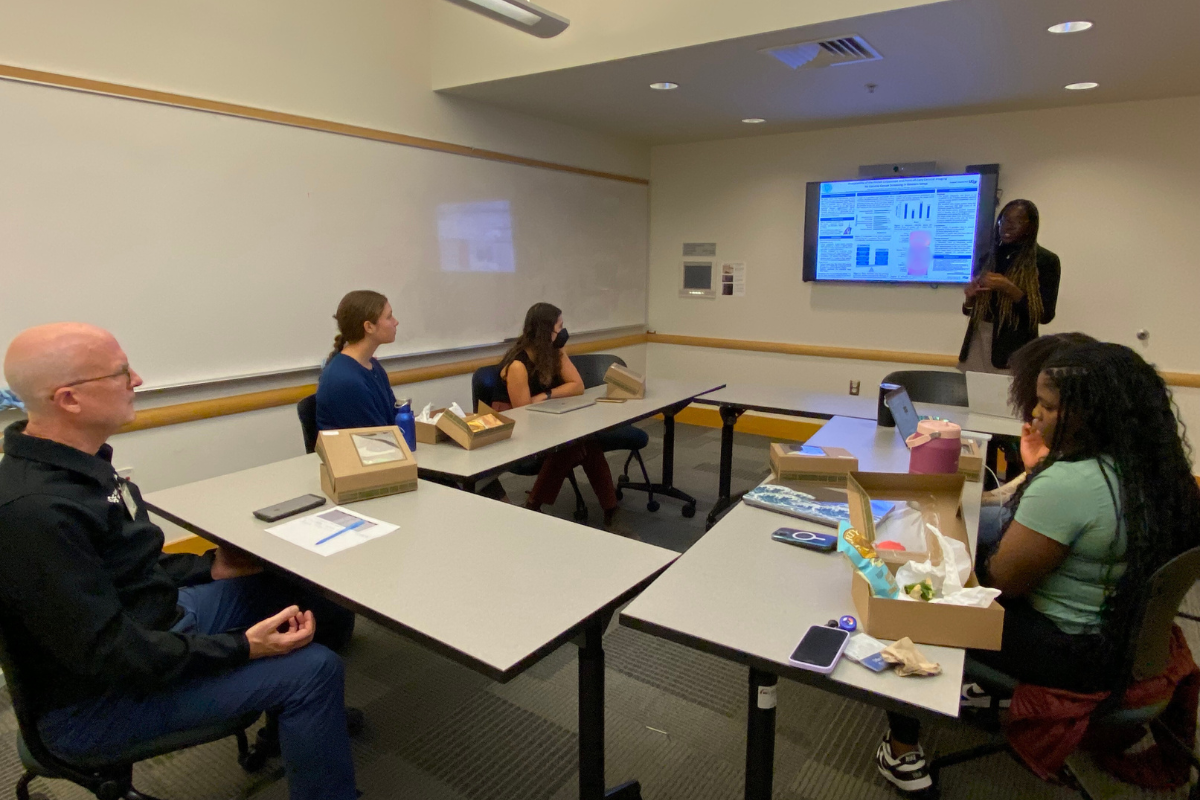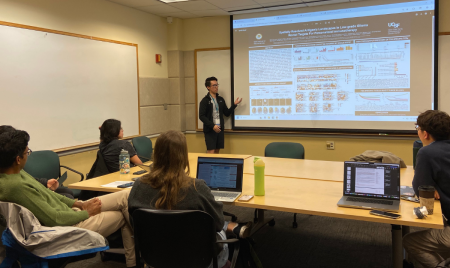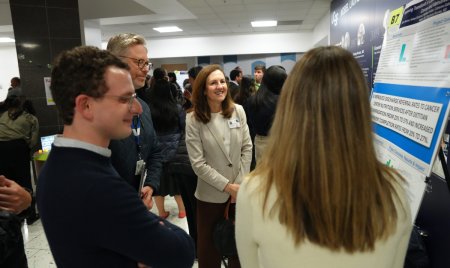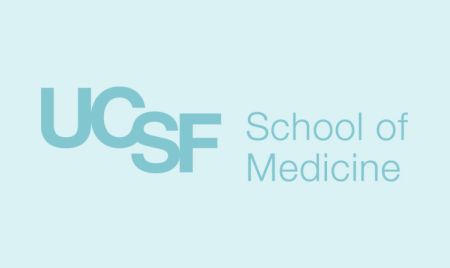Second-Year UCSF Medical Students Showcase Their Summer Explore Research Projects

On November 29th and 30th, second-year UCSF medical students presented their summer research projects at the Summer Explore Symposium held at UCSF's Parnassus Heights campus and hosted by the Inquiry Curriculum. This year, the students gave poster presentations with research topics ranging from fields of clinical to basic science and medical education. Research projects featured at the symposium ranged from overdose prevention in the era of fentanyl to the effectiveness of a machine learning-based health application on patient-provider communication.
The majority of the research was funded through the Summer Explore Research Fellowship, an eight-week program for UCSF medical students that supports all forms of medically-related research carried out full-time between the first and second year of medical school. The program connects the students to potential research mentors, inquiry advisors, and awards a $4,500 stipend through the Inquiry Funding office to 100 selected students. Other funding sources included PROF-PATH, Cancer Center, Varmus Endowed Fund for Global Health, Diane Sklar Global Health Initiative, Heiman Summer Research Fellowship, Curriculum Ambassadors Program, and Surgery Fellowship (Greenberg and Hunt).
The goal of the Inquiry Curriculum, is to teach a “habit of mind.” Each step of the four-year curriculum advances the learner, first to a sophisticated consumer of biomedical science, and then to a producer of new knowledge.
Dr. Mallar Bhattacharya, Inquiry Funding Director, said, “[Summer Explore is] a transformative experience…the first-year medical school students [are] introduced to many aspects of the world of medicine, including seeing patients, learning anatomy, and interacting with their colleagues…[it] can be a launching pad for students interested in a career in inquiry…[and] the importance is not only for the students themselves but also for public health: our alumni, in the course of their careers, will pose new solutions to major health care challenges facing the nation.”
Summer Explore student, Dayana Shariff, said, “I enjoyed the opportunity to explore different forms of research…[and] to practice my scientific communication and writing.”
As part of the Inquiry Awards, the Dean’s Prize in Short-Term Research was awarded to five medical students who demonstrated outstanding scholarship. Awardees were chosen based on the strength of their abstract, their mentor’s nomination, and a successful presentation to the faculty review committee.
Dean's Prize in Short-Term Research
Catherine Gao, mentored by Sasha Gorrell, PhD
Adolescent Patient Perspectives on Eating Disorder Recovery and Family-Based Treatment
Catherine is interested in researching eating disorders and queer/trans health disparities. Their research goal is to explore the adolescents (ages 13-21) in the Eating Disorder Program with their perspectives on eating disorder recovery and Family-Based Treatment (an outpatient eating disorder treatment that has become a first-line treatment for adolescents with eating disorders). They found that participants had mixed experiences with parental involvement in their treatment, and with the treatment's heavy initial focus on weight restoration. Participants named wanting more one-on-one confidential time with therapists and a way to connect with peers or mentors with similar lived experiences.
Talia Ruxin, mentored by Renee Hsia, MD, MSc
Trends By Acuity for Emergency Department Visits and Hospital Admissions in California, 2012 to 2022
Talia enjoys research as it provides opportunities to think about problems seen clinically in patients and in health systems through an objective lens to guide broader healthcare reform. Her research aim was to determine recent trends in California emergency department (ED) visits and ED visits resulting in hospital admission by acuity from 2012-2022. She found that while visits coded as "severe" and "critical" increased during the study period, the proportion of "severe" and "critical" ED visits resulting in hospital admission decreased.
Dayana Shariff, mentored by Rosanna Wustrack, MD
Barriers to Entering Surgical Subspecialities for Hijab Wearing Medical Students
Dayana is interested in the field of education and diversity. Her research aim was to explore the perception of surgical fields for Muslim medical students who wear the hijab and their feelings of inclusion in the operating room (OR) based on dress code. She found that hijab wearing medical students feel tension in the OR stemming from prejudice and discrimination faced during their training.
Emily Taketa, mentored by Yvonne Wu, MD, MPH
Sociodemographic Characteristics and Behavioral Outcomes in Infants with Hypoxic-Ischemic Encephalopathy
Emily is interested in identifying disparities in pediatric outcomes, addressing social determinants of health and finding ways to improve equitable and accessible care for local families. Her research aim was to characterize the behavioral outcomes of infants with a history of hypoxic-ischemic encephalopathy at 2 years of age and to identify the sociodemographic and clinical risk factors associated with atypical behavior. She found that 14% of infants had at least one atypical behavior at 2 years as measured by the Child Behavior Checklist. Among these survivors of HIE, maternal educational attainment was the only independently associated risk factor of atypical behavior, and all clinical factors were not significantly associated. Infants whose mothers never attended college have 8 times higher odds of presenting with atypical behavior at 2 years than infants whose mothers completed college.
Vivasvan Vykunta, mentored by Jason Cyster, PhD
Mast Cells Organize Peyer’s Patch Niches for Induction of IgA Responses
MSTP student Vivasvan's research aim is to understand the signaling axes that maintain the crucial spatial organization for the development of IgA-antibody secreting plasma cells. He found that the mast cell derived serotonin metabolite 5-hydroxyindoleacetic acid signals through G-protein coupled receptor 35 on dendritic cells to organize Peyer patches for the development of IgA mucosal immunity. Their findings uncover a novel role of mast cells in maintaining immune homeostasis and mucosal immunity.
Faculty Mentor Awards
In addition to student awards, Exceptional Mentorship Awards were given by the Inquiry Curriculum to recognize the special dedication of UCSF mentors to nurture leaders, innovators, advocates, and researchers at UCSF. This year’s awardees are:
Michael Bokoch, MD, PhD, Associate Professor of Anesthesia
Tasce Bongiovanni, MD, MPP, MHS, Assistant Professor of Surgery
Sasha Gorrell, PhD, Assistant Professor of Psychiatry
Esther Kim, MD, Associate Professor of Surgery
Justin Libaw, MD, MPH, Assistant Professor of Anesthesia
Jeffrey Velotta, MD, Assistant Professor of Surgery
Maria Wei, MD, PhD, Professor of Dermatology
Rosanna Wustrack, MD, Associate Professor of Orthopedic Surgery
Mary Jue Xu, MD, Clinical Fellow, Otolaryngology









